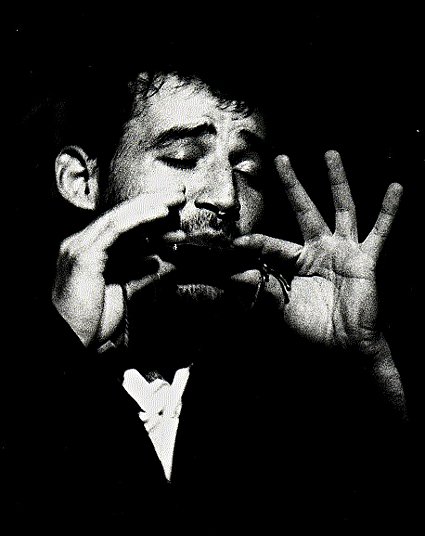MOSCOW-PETUSHKI – The Kana Theatre | monodrama performed by Jacek Zawadzki
date: 29/07/2012 time: 21:00 place: Perła Club artistic program: theatreAuthor: Venedikt Yerofeyev | Script, scenography, direction: Zygmunt Duczyński | Starring: Jacek Zawadzki | Premiere night: 14.05.1989
“Moscow – Petushki,” a monodrama based on a Russian poem by Venedikt Yerofeyev; one of the most important performances in the directing career of Zygmunt Duczyński. The premiere took place in 1989 in Szczecin. The performance in Polish and in English was shown on leading Polish scenes, as well as in London, Edinburgh, Amsterdam, Berlin, Moscow, Los Angeles, San Diego, Orange Country, and San Francisco, meeting with vigorous reception and ecstatic critical reviews.
As Jacek Zawadzki says:
“When I was born in a small town on the Recovered Territories, there was a huge maple tree in front of my window. In the summer it filled all the space with verdure, blocking out the view of houses, people, and the sky. In winter, though, you could see the big station clock right above the house roofs, through its cold, naked branches. The express trains ran through my head with the speed of 160 km/h, not even thinking about stopping in the dormant little town. Non-express trains, on the other hand, dragged sleepily along the moraine hills slowly enough for a person to be able to jump off the train should nature call and easily get back aboard afterwards.
Then there were thousands of other stations. Szczecin became one of them, and that is where in 1988 I met the now deceased Zygmunt Duczyński, the founder of the Kana Theatre. I decided to leave the national theatres and jump into the vortex of new experiences. One day, Zygmunt lent me ‘Moscow – Petushki’ by Venedikt Yerofeyev – a dreamlike poem about a train journey from Moscow to Petushki, where the protagonist’s son and his beloved woman live. I read the book in one night and I was enraptured. For me it was, and still is, an ingenious work. Naturally, Zygmunt shared my opinion and that is how we started working on a monodrama. Since I moved in with him, the process of creating the performance was continuous and very intense, and marked the beginning of a very creative friendship.
We did not see the protagonist, Yerofeyev himself, as a drunkard from a ditch, but a writer-erudite who has knowledge of literature and philosophy. Following this concept – and it was clear to us – politics and alcohol became the completion of a metaphysical journey towards light and love, and the traveller is an aristocrat of the soul. It is a deeply sensitive man, compassionate, and, at the same time, one who attentively observes everything and is witty. Travelling by train, which is a symbol of Christ’s Passion, became a journey through the stations of life – from birth to death.
Atop all of this was another structure, the centre of which was the Kremlin – a symbol of constraint and control over the free choice of an individual. And even if our protagonist did not want to see it, sooner or later he was forced to. It was a closed circle, a labyrinth that Venya could not escape; he had to die. In spite of that, hope shone through almost every part of the poem, hope that you can somehow get out from this journey towards death, during which there is less and less time to tell your story. For Theatre, like its doppelgänger – Life, is very volatile and unstable. And then and there, in Zygmunt’s apartment, all those volatilities met in a way that made all the threads and all the layers of the ‘Moscow-Petushki’ poem come out from and go back to the same source, and actually became a story about each of us.”
ZYGMUNT DUCZYŃSKI (1951-2006) – Director and founder of the Kana Theatre (1979) He finished the Professor Aleksander Bardini Directing College in Warsaw. Important performances: “A Performance” based on the poetry of E. Lipska (1979); “Abaddon” based on “The Inquisitors” by J. Andrzejewski (1981); “The Book of Life and Death of Osip Mandelstam” (1982); “Black Lights” based on the works of J. Genet (1985); “Moscow-Petushki” (1989) and “Night” (1993) based on the texts of V. Yerofeyev; “J.P Discovers America” after Dario Fo (2000); “Bird of Paradise” after R. Słowicki (2000).
JACEK ZAWADZKI (1962) – Polish actor. He finished the Acting College by the Wybrzeże Theatre in Gdańsk. In 1984-1990 actor of the Contemporary Theatre in Szczecin. 1990-1992 member of the Pur theatre group from London. 1992-1997 actor of the Kana Theatre in Szczecin, where he makes two performances: “Moscow-Petushki” and “Night”. 1997-1999 member of The Elements Theatre in Edinburgh. In 1998 makes a film for BBC2, “At the End of On-Line.” 1999-2001 actor of the Polski Theatre in Szczecin. 2001-2012 in America, where he makes a number of short films with director Rene Kerkman, he is a member of the “Flat Iron” artistic group, and plays in a blues-rock band “Banana Street.” In 2012 he comes back to Poland; currently actor of the Współczesny Theatre in Szczecin.
VENEDIKT YEROFEYEV (1938-1990) – An orphan from Siberia, raised in an orphanage. In the ’60s he is admitted to the Lomonosov Moscow State University, he quits after a few months seeing no point in educating his personality in the Soviet education system. As a result, he begins working on the railroad and on the construction of a phone traction. As an ingenious autodidact (like Josif Brodski), he studies literature, religion, and philosophy on his own, becoming an erudite and a witty writer. His poem “Moscow-Petushki” and the drama “Walpurgisnacht, or the Steps of the Commander” become samizdat best-sellers and are translated into 12 languages. After the government denies his leave to undergo surgery in Paris, he dies of pharyngeal cancer in Moscow in 1991.












